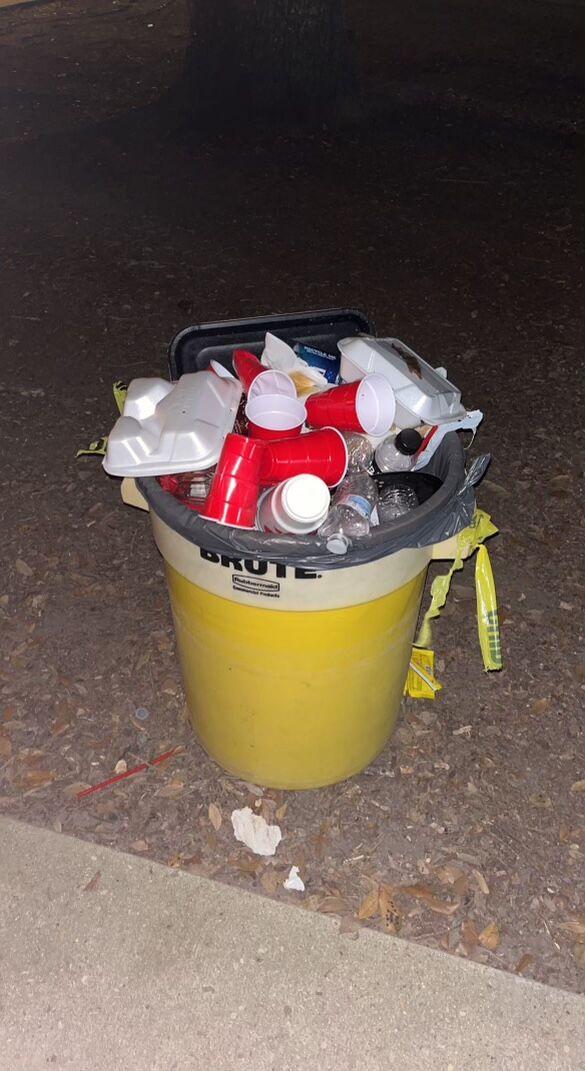LSU is a perennial football powerhouse. It may not seem it after the team’s recent losses to Texas A&M, Alabama and Florida, but the Tigers have held strong as one of the country’s most well-known football teams for decades. Death Valley evokes fear in the hearts of rival teams, and LSU’s tailgates are widely regarded as legendary.
But with a world-class football team, world-class tailgates and world-class fans comes world-class mess. Anyone who has driven down Highland Road the morning after a home game has borne witness to this dirty truth: LSU fans are messy.
According to LSU Landscape Services Director Jeff Brocato, in the wake of LSU’s Oct. 12 victory against Ole Miss, LSU Facility Services harvested 52 tons of solid waste material. On an average home game weekend, Facility Services can expect to harvest around 30 tons of garbage.
So, how does Facility Services get campus spick and span again by Monday morning? Brocato offered some insights.
“The process begins several months before football even starts. We have a meeting with the Athletic Department, and we let them know what supplies we’re going to need,” he said. “This year, we have roughly 5,300 trash cans and recycle bins that we typically put out for a game. We use 14 trailers to put those out.”
Given the magnitude of resources Facility Services has at their disposal, distributing trash cans and recycle bins across campus requires careful coordination.
“Friday morning at 4:00 a.m., two staff members begin staging trash cans in strategic locations on campus, which we break up into eight zones. Saturday morning, roughly 40 to 50 staff members arrive at four, break into eight groups, go out to those eight zones, and begin bagging and deploying the cans into each zone,” Brocato said.
Facility Services staff stay on campus throughout game day collecting trash, emptying full garbage receptacles and assisting fans in throwing away waste products.
This is quite a daunting task: Brocato estimates that on any given game day, 150,000 people roam around campus. No doubt, Facility Service staff members do their best to clean up before game days end. But, as Brocato puts it, “it’s impossible to pick everything up.”
Enter Sunday morning pickup. Here again, Facility Services begins their work at 4:00 a.m.
“Roughly 110 to 120 will break up into eight groups and start dragging trash cans to the streets so the trash trucks can get to them. They’ll also start canvassing their zones and picking up the loose litter,” Brocato said.
Thanks to help from contractors like Baton Rouge Public Services and RCI, Facility Services reliably gets campus back to normal by the start of the work week. But their work is long and grueling.
“The average Sunday pickup normally takes 8 to 14 hours — and sometimes it’s even longer,” Brocato said.
On Monday morning, Facility Services, Landscape Services and the Athletic Department always convene for a post-game meeting to discuss how to improve trash pickup for the next home game, and the cycle continues.
When asked whether Facility Services had become overburdened by trash pickup, Brocato responded politely.
“I think LSU has the best fans in the world. We’ve developed a good relationship with the fans over the years, and the Athletic Department does their best to give us all the resources we need to do a good job,” he said.
Overburdened or not — and whether LSU has the best fans in the world or not — 52 tons of garbage in one weekend is concerning. And considering that the EPA quantifies that around half of garbage in the United States ends up in a landfill, the LSU fandom’s environmental footprint is wide-reaching.
Trash pickup is hard work, and it’s what helps keep LSU’s campus clean.
So before the next tailgate — be it LSU’s matchup against Vanderbilt this Saturday or any future home game — Brocato offered some words of advice: “Every little bit helps. The more time fans hang around and help clean up, the better campus is, and the easier our job becomes.”









